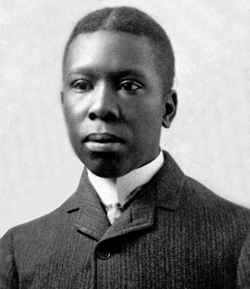But a prayer that he sends from his heart's deep core.

"Paul Laurence Dunbar" was an African-American poet, novelist, and playwright of the late 19th and early 20th centuries. Born in Dayton, Ohio, to parents who had been Slavery in the United States/slaves in Kentucky before the American Civil War, Dunbar started to write as a child and was president of his high school's literary society. He published his first poems at the age of 16 in a Dayton newspaper.
Much of his more popular work in his lifetime was written in the African American Vernacular English/Negro dialect associated with the antebellum South. His work was praised by William Dean Howells, a leading critic associated with the Harper's Weekly, and Dunbar was one of the first African-American writers to establish a national reputation. He wrote the lyrics for the musical comedy, In Dahomey (1903), the first all-African-American musical produced on Broadway theatre/Broadway; the musical also toured in the United States and the United Kingdom.
Dunbar also wrote in conventional English in other poetry and novels; since the late 20th century, scholars have become more interested in these other works. Suffering from tuberculosis, Dunbar died at the age of 33.
If you enjoy these quotes, be sure to check out other famous poets! More Paul Laurence Dunbar on Wikipedia.With our short sight we affect to take a comprehensive view of eternity. Our horizon is the universe.
When you play a team like St. X, you have to play your best, ... St. X is just a great team, so if we can just even keep up with them, we're pretty pleased. It means we're doing OK.
With it all, I cannot help being overwhelmed by self-doubts. I hope there is something worthy in my writings and not merely the novelty of a black face associated with the power to rhyme that has attracted attention.
I didn't start as a dialect poet, ... talked again and again about poetry.
People are taking it for granted that [the Negro] ought not to work with his head. And it is so easy for these people among whom we are living to believe this; it flatters and satisfies their self-complacency.
I simply came to the conclusion that I could write [dialect poetry] as well, if not better, than anybody else I knew of, ... and that by doing so I should gain a hearing. I gained the hearing, and now they don't want me to write anything but dialect.
Copyright © 2024 Electric Goat Media. All Rights Reserved.